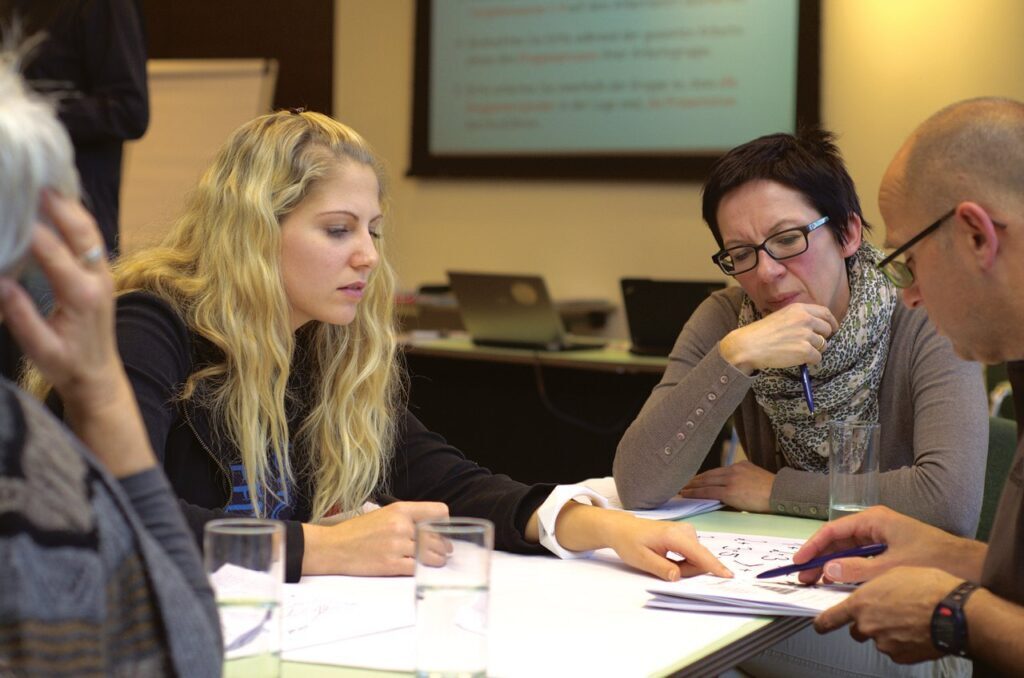
When it comes to hiring tech talent, even experienced HR managers feel unconfident about the success. But this guide will help you adapt your recruitment strategy and find the best candidates for your team.
Recruiters in the engineering sphere face numerous challenges when trying to find a tech/engineering specialist. It makes no difference whether they are to be an in-house full-time employee or a remote contractor for a certain project within a small business or start-up. Both types of employees are difficult to find on the market and (what is more complex) to encourage them to join your team.
To succeed in hiring tech talent, recruiters visit specialized conferences, online forums, and meetings to find answers to numerous questions to optimize their recruitment strategies. In this article, we have gathered the answers to the five most challenging questions of hiring specialists that are frequently asked during those events. These insights will give a new angle on your engineering hiring practice.
1. What to Look For in a CV When Hiring a Remote Tech Candidate?
The process of hiring remote tech talent differs from recruiting an in-house engineering specialist. Remote professionals possess a number of characteristics that make them ideal for doing jobs independently. However, experienced tech recruiters know that revealing those frequently hidden characteristics in a remote candidate’s CV is difficult.
So, what should hiring specialists look for in a remote worker’s CV to make sure the candidate is potentially a good employee?
Self-discipline
Where the willingness is proof that an engineering specialist set out a certain goal and achieved it, self-discipline should be considered a bit differently. It may be seen as the ability to gradually gain or to regularly execute an operation, or by implementing willpower to cope with hurdles and distractions. It's a skill a good remote worker needs to possess.
Enthusiasm
A remote tech specialist should be not only self-disciplined and committed to their work but also self-motivated to do their utmost with minimum or zero control. Remote workers don't have teams to share ideas with, ask for feedback or simply for encouragement. Their readiness to handle their responsibilities at a high level has to come exclusively from within themselves. Their enthusiasm will directly shape their performance.
Time Management
As far as there is no supervision over remote workers, they should manage their time efficiently and be organized. So a CV of a remote engineer should visibly display, or at least lead to the conclusion, that time management is a strength. If a remote worker gets side-tracked or drops behind in their job responsibilities, the impact on a business may be more significant because it might not be immediately noticed.
An Aptitude for Developing Tech Solutions
The practice of remote working increases alongside digital transformation (especially during the Covid-19 pandemic). Technology is expanding opportunities. Employees can now perform their job as efficiently from home using local technology. Remote engineers need to be able to implement dozens of various collaboration tools as well as communication platforms. To do that, they should be proficient in cloud solutions and cybersecurity when working with multiple business platforms remotely.
Know How to Work Independently
All the above-mentioned candidate features escalate into the ability to work independently under a remote mode. However, a remote employee can't expect to succeed if their personality presupposes that they achieve marvellous results exclusively in a team environment. So while screening CVs of remote engineering specialists, search for those that demonstrate a candidate's job experience was predominantly “all by myself” and successful!
Of course the perfect thing to reveal in a remote candidate's CV is previous rich (or at least for 2-3 projects) remote work experience.
Even if the amount of remote-oriented jobs rapidly increases, the number of experienced (and open for work) remote tech talents available is decreasing. Especially those with 5+ years of proven experience. What to do then? All the skills and features highlighted in this guide (either inborn or achieved during multiple projects) will help to indicate whether a certain specialist possesses what it demands to work remotely.

2. How to Design a Better Hiring Process?
Right Questions for a Successful Interview
First, it is essential to understand that the questions for interviews should be chosen depending on the kind of tech specialist you are currently searching for. Recruiters should build their interviews around the skills they are looking for and provide candidates with the chance to show those skills. As there are no two identical candidates, you want the outcome of each interview to be different to help you decide.
Three Sections
In general, experienced recruiters recommend dividing the questions into three sections:
- To check whether the candidate prepared for the interview, ask questions like “What do you know about the company/start-up?” and "Do you know who our business rivals are?". This also helps indicate how sincere their motivation is to work for your company.
- Tech savviness and innovative thinking are vital for good engineers. So test those features. Ask open-ended questions intended to begin a discussion and awaken creativity in the engineering candidate. For example, ask them how they would develop a tool to cope with a certain challenge. Or to select a certain app that they know and demo it to the hiring team. If you are searching for a remote candidate, be ready to ask candidates to demo the solution via Skype/Zoom.
- To test a tech candidate for communication skills, recruiters may formulate a few queries as directions. This provides candidates with an accurate picture of what you intend to understand about them right now. Plus it enables you to see if they can cope with the task. For instance, to assess a candidate’s talent to deliver thoughts efficiently, you could ask: “Can you teach us how to use the app you admire most of all? Please, imagine that we have no idea what it is.”
Testing Tech Skills
After the main part of the interview, it's ideal to schedule a 50-70-minute talk between the candidate and someone from the team who is proficient in their field. Then prepare a brief exercise to evaluate their collaboration abilities.
At this discussion, a member of the team should ask the candidate position-oriented questions. This supports the hiring team in understanding if they posses a great interest in the job they are applying for.
For the exercise phase of this interview part, the hiring team should seek to design scenarios that enable them to witness candidates’ competencies in action. Plus the way they partner with other team members. This exercise phase benefits the candidate as well: they experience how it would feel to work in close partnership with their potential colleagues.
How About Games?
Understanding how potential candidates will interact with other engineers within a team on a daily basis is one of the most significant metrics when hiring tech talent to fit a corporate culture. Assumptions made on a candidate's comments to the questions like “What would your current colleagues tell about you?” are proved not to give reliable results. Whereas interview games (based on engineering topics) enable recruiters to see and analyse real-life interactions.
The game's outcome doesn't matter. Here, the key task of a recruiter consists in noticing indicators of an excellent cultural fit during time players interact. For recruiters, this demonstrates if tech candidates are engaging, thoughtful, and curious. Note that these features depend on the role - i.e. positions that require regular teamwork.
3. How to Attract Passive Candidates?
It's quite common that the engineers you would like to hire are not even searching for new job opportunities. This type of candidate is called passive. In fact, they constitute about 77% of the tech workforce. However, as passive candidates undertake little or zero effort to find a job, it's more difficult to discover them.
Some recruiters might think that if passive candidates don't send CVs, they aren't of great interest. But it's a great mistake to believe that. Many talented tech specialists are currently employed, but may be motivated to look into other work once a desirable vacancy comes along.
Study these 4 strategies regarding how to attract passive tech candidates:
Bring the Company out of Invisibility
If your company/start-up is out of sight, there's a possibility that passive tech candidates don't know your business even exists. That's why it is crucial to have an online presence to catch their eye.
By perceiving hiring passive tech talent as a type of conversion, recruiters explore introducing SEO solutions to establish a company's presence online. So they will publish catchy facts about the employer on the company's website as well as entertaining content on LinkedIn or Facebook.
Passive tech candidates will discover your company as more than just a name and get the opportunity to interact with your brand personally. As time goes on, they will get familiar with your company/start-up. So when you then launch recruitment, they will have already have you on their radar.
An individual approach in candidate online involvement activity wins the reputation for the company/start-up as a desirable place to work. Don't forget to maintain a call to action on the posts of the company's website so the potential candidates are aware of the period when you actively hire.
Interact with Potential Candidates via LinkedIn
LinkedIn is the best place for recruiters to find a gold mine of talented/experienced passive tech candidates. LinkedIn is a career-oriented platform, so the majority of candidate profiles contain relevant data for curious recruiters. Some candidates even point out links to their accounts on Facebook/Instagram/Twitter or online career portfolios.
A good option for recruiters is to use LinkedIn Recruiter to organize a targeted candidate search. As soon as recruiters discover quality tech talent, it's natural to establish communication with these people and offer them vacant positions. The individual will feel complimented in their professional achievements because you picked them out from the crowd. Resulting in positive emotions regarding your company/start-up.
Involve Your Current Employees
When it comes to searching for potential talent for your company/start-up, the perfect proof that your company is the best place to work derives from your current employees. If your company builds an inspiring working environment for your staff, ask them to share their experiences among their personal networks.
Treat your team well so people from their contact list will wish to join your company/start-up as well. To motivate employees to actively hire for you, you could consider creating a referral program that delivers financial benefits for every successful hire.
Promote the Company/Start-up
Implement employer-branding methods. Promote your company/start-up as the greatest work environment for your particular industry by accentuating what makes you different from your rivals. Your strong points might be powerful employee benefits, high pay, flexible schedules, and more.
Develop a unique characteristic of your company/start-up that makes it a workplace of their dreams. Then share it with others through the official website, social platforms, and offline events.

4. Should I Consider Hiring Tech Graduates?
It makes no difference whether you are a big corporation or a small start-up, tech graduates are proved to deliver a wide range of valuable competencies. Naturally, recruiters may be nervous about giving a job offer to an engineering candidate straight out of university. Hiring "green" tech talent isn't without risk. But there are numerous advantages of recruiting graduates that powerfully outweigh any minuses:
Graduates are Highly Engaged
Everyone feels happy about beginning their first job and will make a titanic effort to leave a good impression. Tech graduates deliver fountains of engagement and energy that companies may never receive from established workers later on in their careers. Additionally, they are eager to build their careers wherever they can.
Global research has revealed that millennials desire to climb the career ladder a lot quicker than their parents. As a result, graduates are prepared to fight to keep a foothold in a bit of healthy competition to nurture their careers.
Tech graduates are a “blank canvas"
Graduates resemble sponges that absorb all the new information their first employer delivers to them. As far as they have no (or minimum) experience in the professional environment, you have a wonderful opportunity to teach them. You can also formulate their roles in a way that fits best within your company/start-up. In this way, graduates are a "blank canvas". They're ready to grasp new info, learn new skills and acquire experience in various fields.
They Love and Know Everything about the Tech World
Modern graduates are tech-savvy because they have grown up flanked by advanced technology. So they have developed the ability to quickly master innovative tools and the latest technology. This provides them with a great opportunity to study how to implement any hardware or software needed quickly.
Moreover, tech graduates may well be able to support their colleagues with technology! They also often have a deep grasp of social media, which is beneficial for your networking and branding.
Graduates are Paid Reduced Salaries
Due to their lack of experience, graduates are ready to perform their job duties for a substantially lower salary compared to experienced tech talent.
5. What Do Engineers Expect from Companies?
Engineering specialists want to do the job they feel passionate about. So let's take a reality check: tech talent is in extremely high demand. Moreover, this state of affairs is likely to continue into the near future.
Engineering specialists who don’t sincerely like the projects they are working on will start actively searching for new job opportunities. Therefore to prevent your tech talent from leaving, you need to try to match specialists to relevant projects that will excite and engage them.
However, engineering specialists also want recruiters to accept the fact that their skills and other competencies don’t have to be an ideal match for a certain project. It's essential to realize that tech professionals tend to adapt to a new issue very quickly. Don’t forget that they are trained as problem-solvers. As a result, they can handle a lot with the appropriate tools under a supervision of a skilful project manager.
Tech talent requires a work environment that inspires creativity. Engineering is never only about practical or analytical skills. Ask engineering candidates during interviews what your company can do to encourage more creativity at work. You could get some interesting answers!
Finally, engineers like to experience flexible work variants. So explore how your company/start-up can offer more flexibility in the way employees work.
6. Where are the best places to find tech talent?
B2B engineering marketplaces, as Engre platform, are where well-known enterprises, small businesses, early-stage start-ups, and individual clients go for hiring tech talent. It's a chance to recruit engineers and other tech experts from around the globe with zero violations regarding deadlines or budget. Compare, for instance, the average aerospace engineer salary on ordinary job platforms with those on Engre.
Candidates prefer searching for job opportunities on various B2B platforms because this is where they find ambitious projects that inspire them.
Recruiters shouldn’t worry about how to hire there because the procedure is truly simple. Just establish a budget and reach out the support team of a selected B2B marketplace. You will then get a large database of qualified tech talent based on your project peculiarities. Decide on the specialist who is the best fit. Then enter negotiations with them and relish future fruitful cooperation.
Be reassured about safety as professionals on B2B marketplaces are strictly audited in terms of reliability. Moreover, all of them have appropriate certificates and perform their jobs based on global regulatory policies. Explore hiring tech talent through platforms such as TopTal and Upwork, as well as Engre.
Glassdoor deserves the special attention of recruiters because it has a positive reputation for social influence on job seekers. 99% of tech candidates use Glassdoor to write as well as reveal anonymous feedback about companies. To attract engineering candidates via Glassdoor, create a positive employer brand while being innovative and fair.



